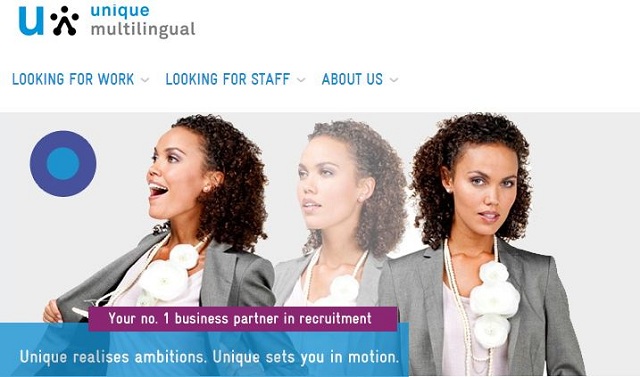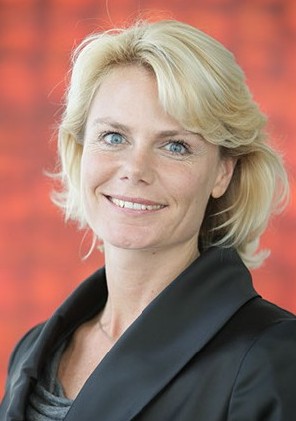
Unique Nederland, as part of USG People, has different substructures, one of which is Unique Multilingual (UML). What is the specific place and focus of UML within the larger company?
S.C.: Unique Multilingual is, within Unique Nederland, the team of specialists in multilingual recruitment of office personnel for companies of various sizes. By multilingual, we mean non Dutch speakers, therefore native speakers of other languages, or Dutch natives who speak English and a third language.
The team at UML is itself composed of internationals with a total of 11 different nationalities, people who are either expats in Holland, or Dutch with an international background. And we love working with internationals. In fact, we created a day to thank our internationals for being here, a UML International Day on November 22nd.
How would you describe the current trends on the employment market in The Netherlands?
S.C.: We can confirm the current times are not the best, yet, if you compare it with the Dutch employment market, we can say the international market is doing better, with some regional differences.
K.B.: The trends on the current employment market are not just the Dutch ones, they are linked to other economies. If one economy is doing well, a current example being Germany, then the companies working with that market will also do well. As a result, there is a wider range of jobs within companies which deal with those other countries, which may account for the better current situation of the international employment market.
S.C.: What we also notice lately is that it has also become difficult to find very good candidates. This is a result of companies from all the regions asking for those candidates who are fluent in combinations of languages which include German or French. The high request leads to scarcity of those specifically skilled candidates.
K.B.: When facing difficulties with the developments on the market, we keep creative, using social media, or relying on our network.
UML has locations in Utrecht, Amsterdam, Eindhoven, Rotterdam and The Hague. How does UML operate according to these regions?
S.C.: All these markets are continuously changing, so it is difficult to point out the differences. Still, the market in The Hague is, we notice, slightly bigger than in Utrecht or Eindhoven. The job profiles also differ per region, with Brabant hosting companies which work with the Benelux, and therefore look for candidates who speak, for instance, Dutch, English, and French. The profiles of the companies vary as well. In The Hague we find more governmental institutions, whilst in Amsterdam and Eindhoven, a lot of shared service centers are active.
What is the profile of the UML candidate? Where is he/from, what is his/her level of education and experience, and what are his/her goals?
K.B.: We receive applications from all kinds of candidates. It is the type of position that will attract a certain candidate profile. On average though, most candidates are European, yet we also get all types of nationalities from outside the EU. Those last candidates need a work permit or are married with a Dutch person and live here as expats, falling under spouse employment. Within the EU, of course, there is flexibility when it comes to working, so Europeans move fairly easily.
S.C.: In addition, most candidates are highly educated. Work experience is also important. As a starter though, it can be difficult to find positions, because there is a lot of competition on the recruitment market right now.
How did this profile evolve during UML’s years of activity, also in relation to the job profile?
K.B.: Since I began working in our office in The Hague, in 2009, with the financial crisis settling in, I noticed a switch in the companies’ approach towards us presenting them candidates. Whereas before we could introduce a candidate based on his/her soft skills, namely personality, now we see the hard criteria, the concrete background of the person, weighing more. The leading tool in recruitment now is the CV. Further, nowadays, social media skills are important, and working with the internet. Specialists, people with specific experience, or knowledge migrants, are also advantaged compared to candidates who can fill a support position.
S.C.: In fact, multi-tasking in general is a desired skill in our society, as is the technical experience. Even if needing to be aware of their budget, companies need to develop and continue to innovate so as not to be left behind, which is where the IT or technical aspects come into place.
Except recruitment, what further assistance do you offer internationals?
S.C.: We offer candidates, as well as our employees, an intercultural communication training. Working in a team of various nationalities, it is very important to be able to communicate successfully, being aware of the cultural differences.
K.B.: Furthermore, we look at and test the skills of a candidate and, if necessary, we can offer language or IT-related trainings to increase the chances on the job market.
S.C.: Finally, we offer assistance with living in The Netherlands, trying to basically show candidates around, and explain, for example, how to get a BSN number, how the tax system works and so on.
On your clients’ side, what reasons are most common when deciding to hire an international candidate?
K.B.: The work languages represent the main reason. Yet, what is also of importance is that a company has an international culture or environment itself. Our team here at UML is an example of that.
S.C.: Indeed, it is the language, but it can happen that, once got to know an international work environment, you don’t want to go back. There is so much to learn from other cultures, from each other, there is openness and acceptance within the teams, and I consider that a strength.
Do some companies have preconceived ideas about certain internationals, for example from less developed countries?
S.C.: We do not see that at all, actually. Our clients have an international profile themselves, so they appreciate different cultures. We are here to find the best candidate, that is about the skills, and not the nationality, and we wouldn’t work with a company that would be discriminative in any way.
K.B.: The cultural differences can be worked out, for example, in the case of the more emotional, or temperamental nationalities faced with the Dutch directness, down-to-earth attitude.
What are the languages which attract most interest for employers? Are the big European languages still the most interesting, or do you notice changes in your clients’ approach?
S.C.: There are some language combinations which are regularly asked for by our clients, specifically Dutch-English-French or Dutch-English-German, all three on a fluent level.
K.B.: It happens rarely that we receive calls for Arabic, Indian, or Asian languages, for example, and those rare occasions are usually projects. It is then necessary to take time and search well in order to find the right candidates, as they need a work permit.
How do you evaluate the career growth opportunities for internationals in The Netherlands?
K.B.: When it comes to career growth here in Holland, I don’t think there is a difference between the Dutch and the internationals. The possibilities to grow within a company are equal if a person has a good background and ambition. It is always great when candidates come back to us after, let’s say, five years of working, and we see how much they’ve evolved in their careers.
Finally, Do you have any tips for internationals seeking work in The Netherlands?
S.C.: To get you started, it sometimes is a good idea to take on work which is not exactly what you had in mind. It is a way to gain experience, which will help with future applications, and it will open up opportunities.
K.B.: I would add be flexible with your salary. Some people have very high expectations when it comes to this aspect. In The Netherlands, you need to start somewhere and build your way up, you cannot always start at the top. In our activity, we always try to sketch a realistic way of finding work and refrain from making promises we cannot keep.

SYLVIE CRAENEN - GENERAL MANAGER UNIQUE MULTILINGUAL
